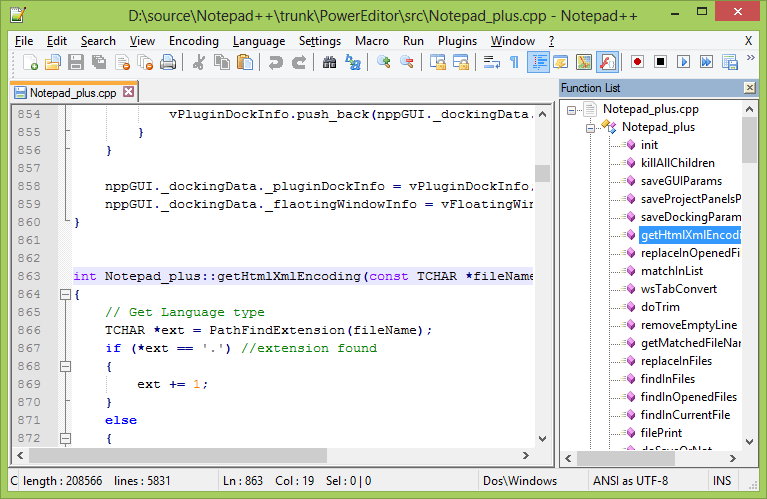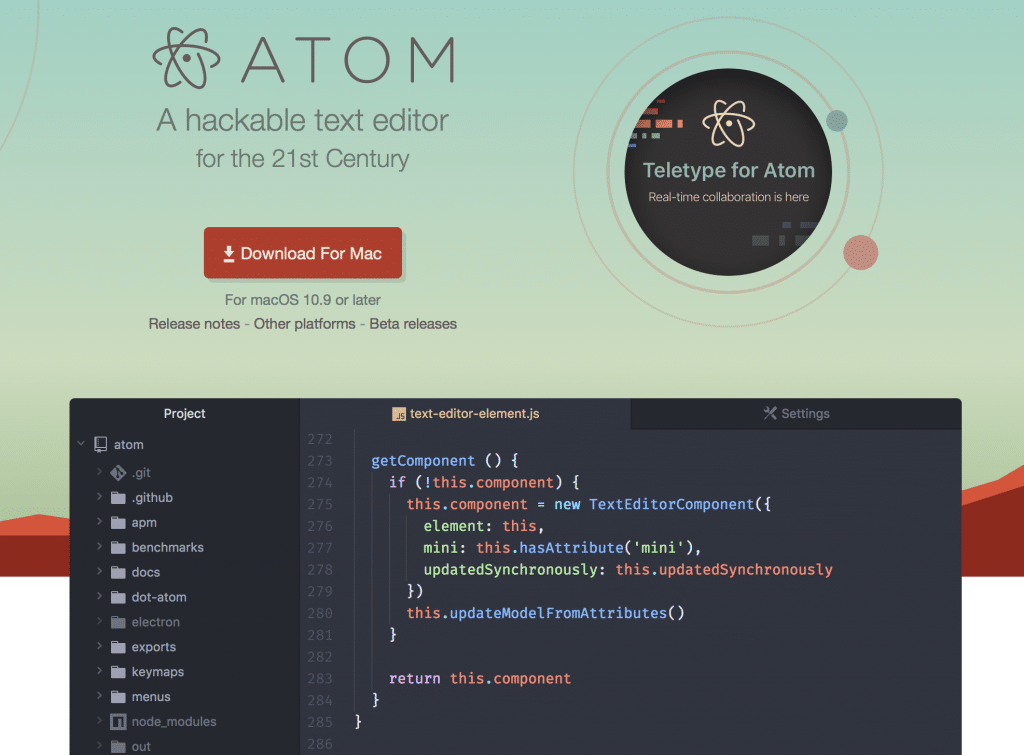BLUEFISH

Bluefish is an easy-to-install and use text editor targeting Linux programmers and web developers. It offers a wide set of features as listed below:
- Lightweight and fast
- Integrates external Linux programs such as lint, web link, make and many others and filters, piping such as sed, sort, awk and many more
- Spelling checks feature
- Supports working on multiple projects
- Remote file editing
- Search and replace support
- Undo and redo option
- Auto-recovery of modified files
NOTEPAD++

Notepad++ is a free and popular advanced text editor for the Windows operating system. It is very versatile in looking at all types of files and it has many programming language syntax highlighters built in.
A great quality code editor like Notepad++ comes with a wide range of great and useful features and can be extended using plugins. It is a wonderful and simple option for beginners as well as for developers.
ATOM

Atom is a multiplatform code editor (Windows, Linux, and Mac) that can be used for free and, a perfect tool for junior and advanced programmers. This code editor tool has all the features you could ask for in a code editor like a context autocomplete system, language autodetection, syntax highlighting, the possibility of using different panels and much more.
The text editor is very easy to customize, and you can search for and install new packages to get you started with your customizations.
BRACKETS

Brackets is a modern open-source code editor designed for web designers and front-end developers that are working in HTML, CSS, and JavaScript.
The interface of this code editor is very easy to navigate, and the extensions offer a variety of options. The Live Preview option is a really helpful tool because you get instant feedback on any changes to your code.
VI/VIM EDITOR

Vim is a powerful command line based text editor that has enhanced the functionalities of the old Unix Vi text editor. It is one the most popular and widely used text editors among System Administrators and programmers that is why many users often refer to it as a programmer’s editor. It enables syntax highlighting when writing code or editing configuration files.
NANO EDITOR

Nano is easy to use a text editor, especially for both new and advanced Linux users. It enhances usability by providing customizable key binding.
Nano has the following features:
- Highly customizable key bindings
- Syntax highlighting
- Undo and redo options
- Full line displays on the standard output
- Pager supports to read from standard input
GNU EMACS

This is a highly extensible and customizable text editor that also offers an interpretation of the Lisp programming language at its core. Different extensions can be added to support text editing functionalities.
Emacs has the following features:
- User documentation and tutorials
- Syntax highlighting using colors even for plain text.
- Unicode supports many natural languages.
- Various extension including mail and news, debugger interface, calendar and many more
GEDIT

This is a general purpose GUI based text editor and is installed by default text editor on Gnome desktop environment. It is simple to use, highly pluggable and a powerful editor with the following features:
- Support for UTF-8
- Use of configurable font size and colors
- Highly customizable syntax highlighting
- Undo and redo functionalities
- Reverting of files
- Remote editing of files
- Search and replace text
- Clipboard support functionalities and many more
- alities
Also, remote file editing and many other features including advanced editor features, applications features, programming features, text highlighting features, backup features and search and replace features.
LIME TEXT

This is a powerful IDE-like text editor which is a free and open-source successor of popular Sublime Text. It has a few frontends such as a command-line interface that you can use with the pluggable backend.
PICO EDITOR

Pico is also a command line based text editor that comes with the Pine news and email client. It is a good editor for new Linux users because of its simplicity in relation to many GUI text editors.
JED EDITOR

This is also another command line editor with support for GUI like features such as drop-down menus. It is developed purposely for software development and one of its important features is support of Unicode mode.
GVIM EDITOR

It is a GUI version of the popular Vim editor and it has similar functionalities as the command line Vim.
GEANY EDITOR

Geany offers basic IDE-like features with a focus on software development using the GTK+ toolkit.
It has some basic features as listed below:
- Syntax highlighting
- Pluggable interface
- Supports many file types
- Enables code folding and code navigation
- Symbol name and construct auto-completion
- Supports auto-closing of HTML and XML tags
- Elementary project management functionality plus many more
LEAF PAD

This is a GTK+ based, lightweight GUI based text editor which is also popular among Linux users today. It is easy to use by new Linux users.
It has the following features:
- Codeset option
- Allows auto detection of codeset
- Options of undo and redo
- Display file line numbers
- Supports Drag and Drop options
- Printing support
KATE/KWRITE

Kate is a feature rich and highly pluggable text editor that comes with KDesktop Environment (KDE). The Kate project aims at the development of two main products that are: KatePart and Kate.
KatePart is an advanced text editor component included in many KDE applications which may require users to edit text whereas Kate is a multiple document interface(MDI) text editors.
The following are some of its general features:
- Extensible through scripting
- Encoding support such as Unicode mode
- Text rendering in bi-directional mode
- Line ending support with autodetection function





No comments:
Post a Comment